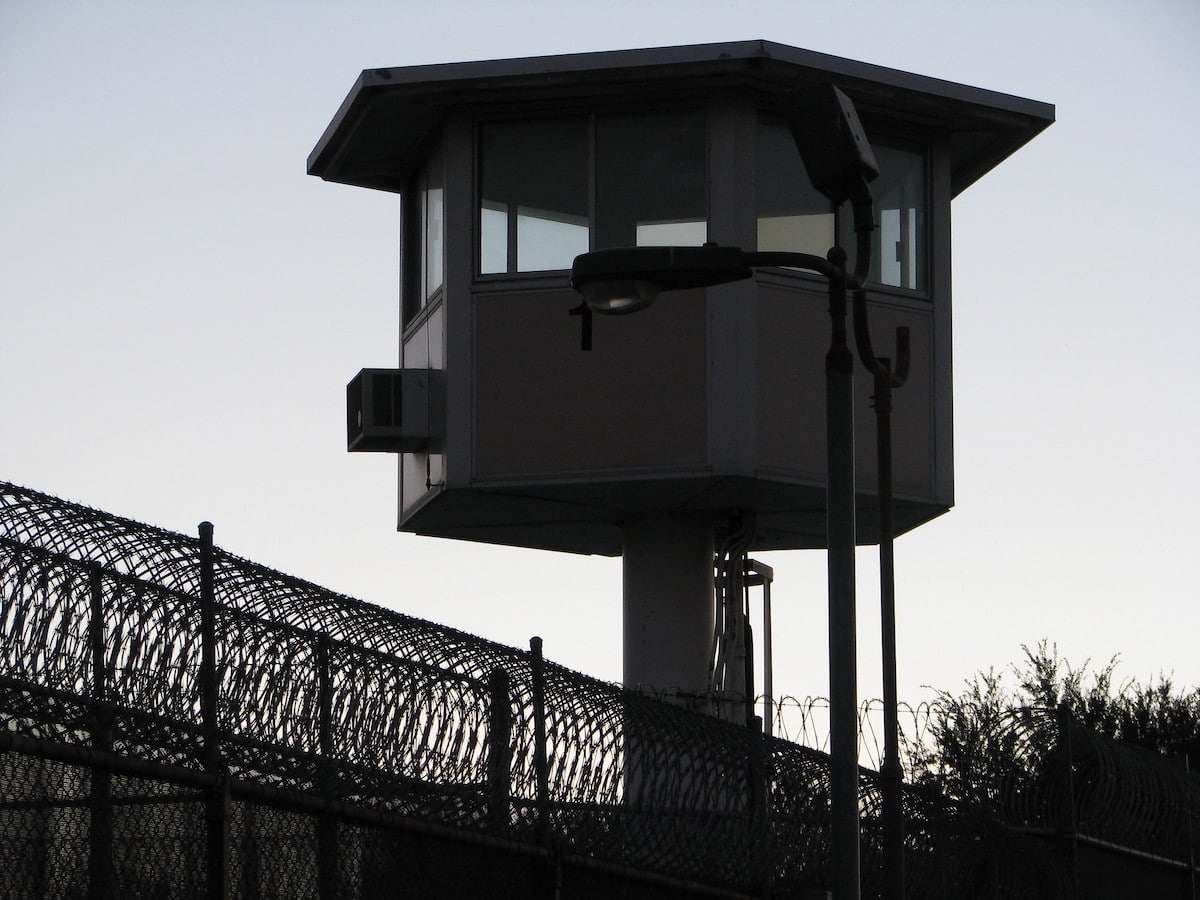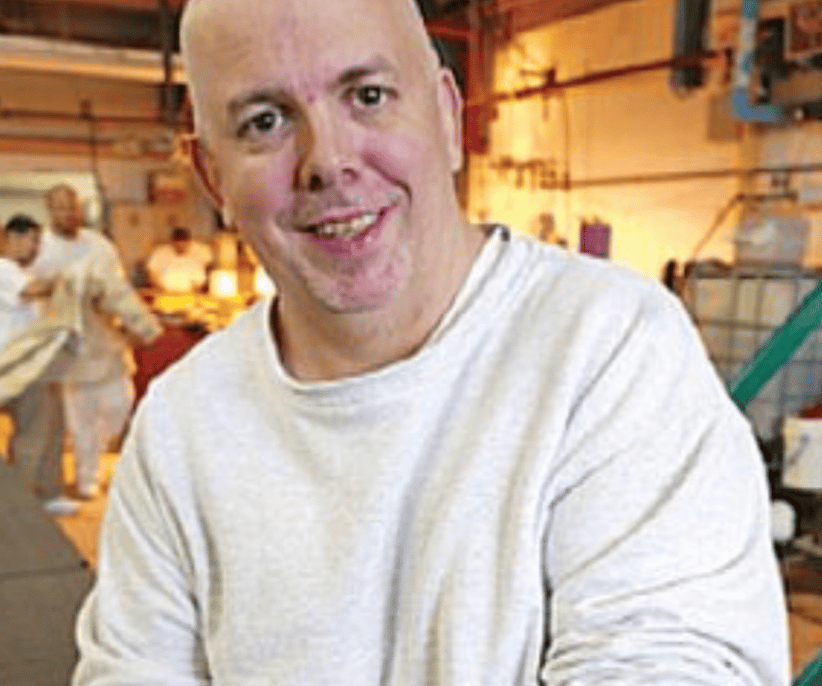For several months, the country’s COVID cases have been in a relative downtrend. In the free world, many people can take off their masks, travel to see loved ones, or go to the movie theater—even if reports of new variants and case rises can easily bring back that all-too-familiar anxiety.
Here in Washington State prison, COVID restrictions never left. Our mask mandates have stayed in place. Social-distancing requirements are constantly enforced. Beyond that, we live with the daily knowledge that a single sick staffer walking into our overcrowded petri dish will put us back into the dark ages of COVID lockdowns. On the big yard, drab Desert Storm-colored tents still stand ready to be used as hospital centers. Outside the gym, stacks of boxes brimming with hazmat gear and sleeping cots wait for our rec area to be converted once again into a medical quarantine zone. Prison officials left this stuff in place, knowing it would be used again.
Takers come adorned in hazmat gear, and none of us know exactly where we will be taken.
It’s a constant fear we live with—that someone will test positive and the havoc will start all over.
We know what that will mean: Takers come adorned in hazmat gear, and none of us know exactly where we will be taken. It may sound paranoid, but we keep go-bags packed, like doomsday preppers, just in case they come for us.
And it’s no idle fear. It’s happening again.
Monday they got Tone. Wednesday they came for Frodo. On the day we’re writing this, our entire unit went on quarantine. Units are being set aside again for infected people, and several pods besides ours are on lockdown.
COVID is a health threat, but after two years of living under the constant possibility of contracting it, and worse (the subsequent trip to solitary confinement), anxiety is becoming a pandemic of its own. Anyone in prison knows, it’s not the sickness that scares you. It’s the unyielding uncertainty.
Doing time is mostly about making it to the end of your sentence with as much of yourself intact as you can. And for just about everyone, this requires predictable routines, as setting what to do and when is about the only way to exercise power in an environment designed to keep you powerless. So you develop work-out programs, sign up for classes, get a job and find other ways to make the time manageable. You insulate yourself from state violence to the extent you can, and try not to get caught up in other people’s drama.
What you don’t want, ever, is change. Change is almost always bad.
Prison officials know this, which is why they create orderly schedules that divide time up into little discrete and digestible bites. They post these schedules on the wall. And we prisoners build them into our daily routines. Routines are important—especially when 60 guys share three shower heads, three toilets and a handful of functioning sinks.
Yet at the same time, you recognize that these habituated practices to which you continue to cling have turned into pathology in others—mostly the people who have been in for a while. A late count in the morning or a canceled recreation period around noon can send them into a tailspin.
“I don’t know why it’s so important to me that I not miss my workout time; it’s not like I’m going anywhere. But there are so few things that I have control over.”
Seeing this, we all try to find balance between necessary habit and the slippery slope to disorder. But really, no matter what you do, after a few years spent inside, OCD and PTSD are no longer just initials. They’re like those annoying and ever-present friends you wish you didn’t have. You feel them scratching at the back of your mind, constantly. You’ve seen these changes happen in others and you swear they will never happen to you. But in moments of reflection, perhaps after a hiccup in the schedule has you red-faced and irate, you realize they’re taking root.
T, a lifer, sums it up this way: “I don’t know why it’s so important to me that I not miss my workout time; it’s not like I’m going anywhere. But there are so few things in my life that I have control over, so when yard is late or canceled I just feel like they are intentionally screwing with me. And then when a guard gets on the loudspeaker and makes some joke about ‘recess being canceled,’ which happens a lot, I just have to go to my cell so I don’t do something I’ll regret.”
For many people, those red-faced moments have been dominating life for the last two years, as COVID outbreaks and unexplained protocols have destroyed all sense of predictability. The weight decks are shut down. The classrooms are closed. Work is sporadic at best. Even mealtime isn’t reliable: You don’t know what’s for dinner or whether it will be at 4 or 8 pm—just hopefully not in the middle of your shower time.
And there’s always that threat of the ultimate change: a positive COVID test that sends you to solitary confinement, which of course staff will call “medical isolation.”
It’s the suspense of never knowing if or when you’ll be shuffled off to isolation that really takes its toll. “I’m young and healthy, so even if I catch it I probably won’t know it,” said Jay. “But that’s what stresses me out the most. Every couple of days the nurses come in and test us. But we never find out who is positive until three days later, when the Takers come with their list in hand.”
His feelings are not unique: “There’s nothing I can do to make this stop. At this point I just want to catch it and be done.”
Last year when the Takers came, we weren’t ready. Nick spent 19 days on the gym floor after being told he could bring only a small paper bag.
Jay knows, like the rest of us, that for now the best thing to do is buy some insurance to mitigate the anxiety. You build a small stockpile of essentials—some ramen noodles, an extra toothbrush, a few good books, etc.—and you keep these things packed in a go-bag, just in case your next COVID test comes back with bad news.
It’s the logical thing to do. After all, last year when the Takers came, we weren’t ready.
Nick spent 19 days on the gym floor after being told he could bring only a small paper bag with hygiene items. Tomas was given a similar directive, before starting his journey with a weeklong trip to the Intensive Management Unit (previously used only for punishment) and another week spent in the gym.
Our friend Juan, another alumnus of the gym, said, “I wasn’t prepared for that chaos, and I’m not gonna let that happen to me again. This time they are saying we can take two boxes, and I will be packing everything.”
Every time the Takers come in with their list of names, nearly everyone holds their breath until it’s over. It’s sad to see other people get taken. And the guilt-stained relief we feel is real, and heavy. We exhale and there is a cacophony of conversations. It’s shitty to say, but everyone is thinking it: Sucks to see them go, but at least it wasn’t us. At last, anxiety explodes into a weird combination of dark humor and outrage at the conditions we’re all in.
“Would you like to try a sudoku?”
The mental-health lady dropped by the unit the other day to check up on us. She was handing out crossword puzzles. Stopping at one guy, she asked how he was doing. He said, “Terrible.” And while her words were hard to understand, muffled behind the mask and face shield, he swears she responded, “Would you like to try a sudoku?”
She’s not a bad lady. But there’s really nothing she can do—we all know that.
The part of this whole experience that is the most troubling, the most frustrating, is that these boiling-over anxieties are with us to stay, like mental scars.
“I’m pretty sure I lost part of my mind in isolation last year,” said Steve. “During that time my grandma passed away from COVID, and the combination of dealing with that while not having any contact with my family was devastating. Even though it would have been a lie, I just wanted to hear my mom tell me that everything was going to be ok. This year, the constant threat of returning to isolation is really wearing me down.”
To be honest, we all feel pretty worn down. For as long as the two of us can remember (over 30 years of combined incarceration), a primary goal of Corrections has been to keep things stable. Yet things now are more chaotic than ever. On the outside, it sounds like things aren’t as bad as they once were. On the inside, the pandemic of anxiety rages on.
Photograph by Rennett Stowe via Flickr/Creative Commons 2.0






Show Comments